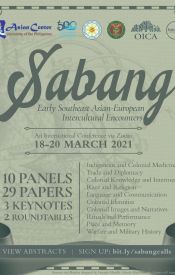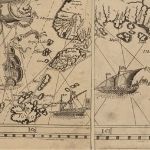Sabang
REMINDERS for PRESENTERS
Please take time to go through these reminders to help ensure a smooth webinar experience for everyone. These may all be subject to change, so please check back regularly, by 17 March, and even during the conference, for updates here and/or via email.
Join Link and Sign-In
- Presenters DO NOT NEED to fill out the registration link above. That is only for the audience (non-presenters).
- Sometime before the conference, panelists will receive an email containing the link to join the webinar/conference as a panelist.** Please check your email's Spam folder. It is advised that you star this email or add it to your email's favorites to help you locate it easily. The sender is "Asian Center UPD" and the subject line is "Panelist for...."
- If you have not received your "Join Link" by 15 March, please inform the Conference Secretariat.
- Your join link is tied to your Zoom account, so it is unique/exclusive to you. Please don't share it with anyone else.
- Presenters must click the said link and just sign in to their Zoom account. To help ensure a smoother log-in experience, sign in to your Zoom account first before clicking on the link.
- The same "Join Link" will be used for the entire three-day session. There is no need to re-register.
**The conference secretariat will notify presenters if and when they should expect the Join link, and receive additional instructions. As with the audience, signing in to a Zoom account is required for panelists.
Q&A
Please consult the Q&A tab to read how the Q&A will proceed.
Call Time
Presenters must log in at least 30 minutes before their panel, though they may of course attend the other sessions. This early start can help you get settled and address any technical issue.
Renaming Your Zoom Profile
Sometime before the conference, please log in to the Zoom website, go to Profile, and click "Edit" to rename yourself thus: P1 Amy Peralta. P1 means Panel 1, and so on. This will help the conference team to identify you more easily and anytime during the webinar.
Introduction of Panelists
The moderators/ emcees will introduce each panelist before playing the recording of his/her presentation.
During the Presentations
The conference staff will play your pre-recorded presentation, but we do ask that you have it (both the file of presentation and the video) on hand and be ready to screen-share, just in case the conference staff encounters a technical difficulty. We hope it doesn't come to this, but you'll never know.
In-Webinar Communications Outside Zoom
We will use the Zoom chat feature as much as possible to send messages to all presenters, so kindly monitor the chat window as often as you can. However, the Chat window can sometimes get too crowded, and it may be difficult to backread.
Thus, please always be on the lookout for email announcements (to be sent to your Zoom email address). Also, you may also wish contact us via Facebook Messenger (https://www.facebook.com/upasiancenter) or via Google Hangout (This email address is being protected from spambots. You need JavaScript enabled to view it.) or just email the conference secretariat.
The conference team is also exploring online websites to facilitate in-webinar communications and interactions with the audience. Please expect updates soon.
Recording of the Webinar
The entire conference will be recorded.
REMINDERS for the AUDIENCE
Please take time to go through these reminders to help ensure a smooth webinar experience for everyone. These may all be subject to change, so please check back regularly, by 17 March, and even during the conference, for updates here and/or via email.
For Non-Presenters (Audience)
- Please click on the registration button above. Registration is free.
- Upon registration, you will receive an email containing a link to join the conference. Please check your Spam folder if you don't see it in your main inbox. The sender should be "Asian Center UPD."
- Please do not share that link with anybody else; it is unique/exclusive to you.
- Signing in to at least a basic/free Zoom account is required to attend the conference. To help ensure a smoother log-in experience, sign in to your Zoom account first before clicking on the "Join link."
- The webinar can accommodate only 500 at any given time, so joining/participation is available on a first-come, first-served basis.
- Please keep comments and questions fair and professional from sending rude/derogatory comments or questions to the panelists/organizers. The organizers reserve the right to remove from the webinar participants who send rude/demeaning messages.
- The same "Join Link" sent to you can be used for all sessions even on a different days. There is no need to register again.
- Livestream may be initiated ONLY IF the participants exceed 500, so please register still.
Q&A System
See Q&A tab.
Recording Notice
The entire conference will be recorded.
MARCH 20: PROGRAM
Click/unclick on the tabs to view/close the content. Multiple tabs can be open at the same time.
Click on the titles to pop up the abstracts. View PDF of Program and Book of Abstracts.
08:15 am • Panel 7: Colonial Images and Narratives
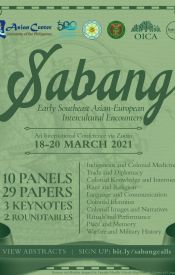
8:15 AM – 9:45 AM
PANEL 7: COLONIAL IMAGES AND NARRATIVES
Revisiting the Boxer Codex: How the Filipino “Indio” within Early Modern Colonial Encounters Uncovers the Construction of the Filipino Identity
Jessica Nicole R. Manuel, University of the Philippines Diliman • Watch on YouTube
The Mingling of Asian and European Art Traditions in the Boxer Codex Illustrations
Clio Kimberly R. Tantoco, University of the Philippines Diliman • Watch on YouTube
Búyo in the Narratives of Early Spanish-Austronesian Intercultural Encounters
Mark Anthony B. Cabigas, Samahan ng mga Mag-aaral ng Kasaysayan, Philippine Normal University • Watch on YouTube
10:00 am • Panel 8: Rituals and Performance
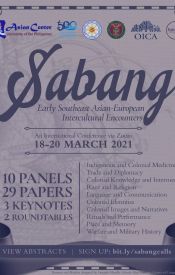
10:00 AM – 11:30 AM
PANEL 8: RITUALS AND PERFORMANCE
An Orosipon ni Ina: A Case for the Syncretic Origin of the Peñafrancia Festival in Bicol, Philippines
Al B. Rodriguez, Asian Center, UP Diliman
Colonizing Blood Covenants: Ritualized Friendship and Contractual Colonialism in Early Filipino-Spanish Encounters
Arthit Jiamrattanyoo, University of Washington (WITHDRAWAL)
Sayaw sa Ginunting: A Postcolonial Analysis of a Wedding Dance
Kyle Philip M. Ravena, University of the Philippines Diliman
12:30 pm • Panel 9: Place and Memory
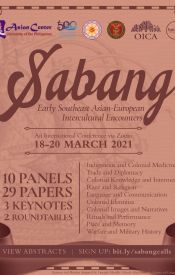
12:30 pm–2:00 pm
PANEL 9: PLACE AND MEMORY
Indigeneity and Ethnicity of Suverna Bhumi (Burma): A View from Colonisers
Sumit Mondal, Central University of Gujarat and Sampayan Chakravarty, Delhi University
A Local View from Northeastern Taiwan to Understand Intercultural Encounters between Europe and Asia and their Indirect Effects
Li-Ying Wang, University of Washington
From Remembrance to Recreation: Memory of European Houses in Urban Landscape Manila (Philippines) and Saigon (Vietnam) during the Colonial Period
Nguyet Thi Minh Nguyen, Faculty of History, College of Social Sciences and Humanities, Vietnam National University
02:15 pm • Keynote 3: Shifting the entrepôt paradigm: Local Agents and Indigenous Voices in the Making of Manila’s Global Connections, ca. 16th-18th Century
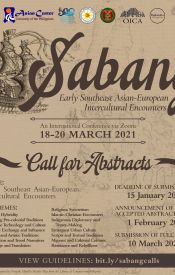
2:15 pm–3:30 pm
KEYNOTE ADDRESS
Shifting the Entrepôt Paradigm: Local Agents and Indigenous Voices in the Making of Manila’s Global Connections, ca. 16th-18th Century
Dr. Birgit Tremml-Werner, Linnaeus University, Sweden
In recent decades, a rich body of scholarship has demonstrated that Manila was more than just a trans-shipment port. Studies on far-reaching intra-Asian, Austronesian, and trans-Pacific connections have posed a challenge to narratives of both galleon-centricity and irrational colonial governance. Yet, there continues to exist an overemphasis on actors and processes reaching the Philippines from abroad, while both indigenous agency and colonial policies are rendered secondary to the course of events. However, from the sixteenth century onwards, a long list of ‘connectors’ including among many others ‘mestizo de sangley’-interpreters, provincial parish priests, colonial officials, indigenous chiefs, localized foreign residents, indigenous allies, beatas, and Spanish women, were at the heart of local and global projects. Zooming in on such local agents opens up new vistas for a nuanced global history of a connected archipelago.
03:45 pm • Panel 10: Warfare and Military History
